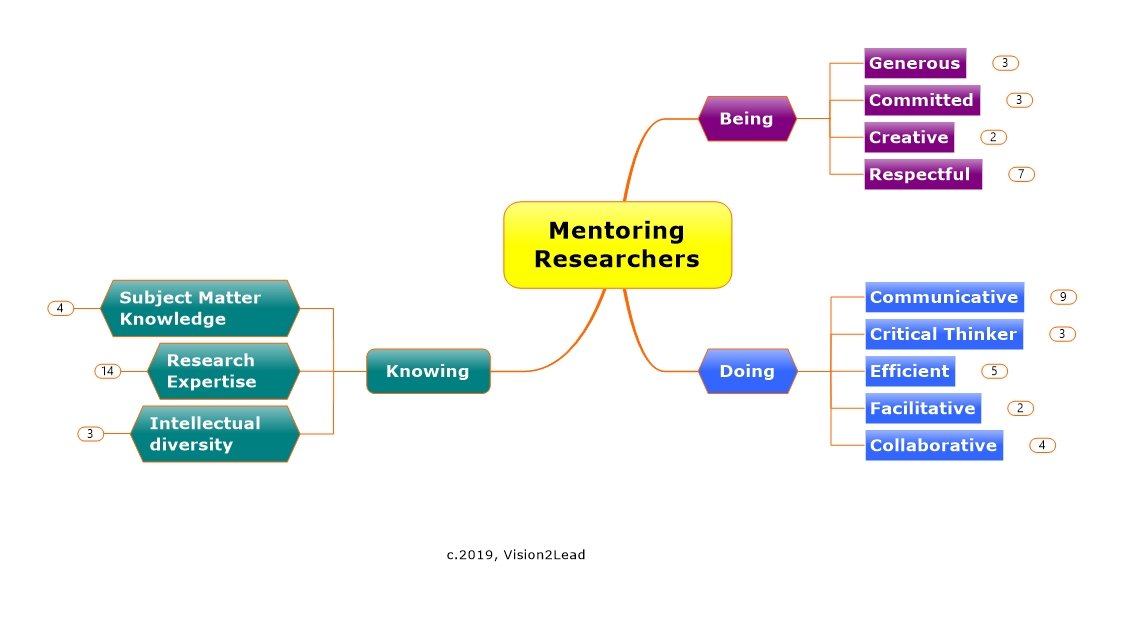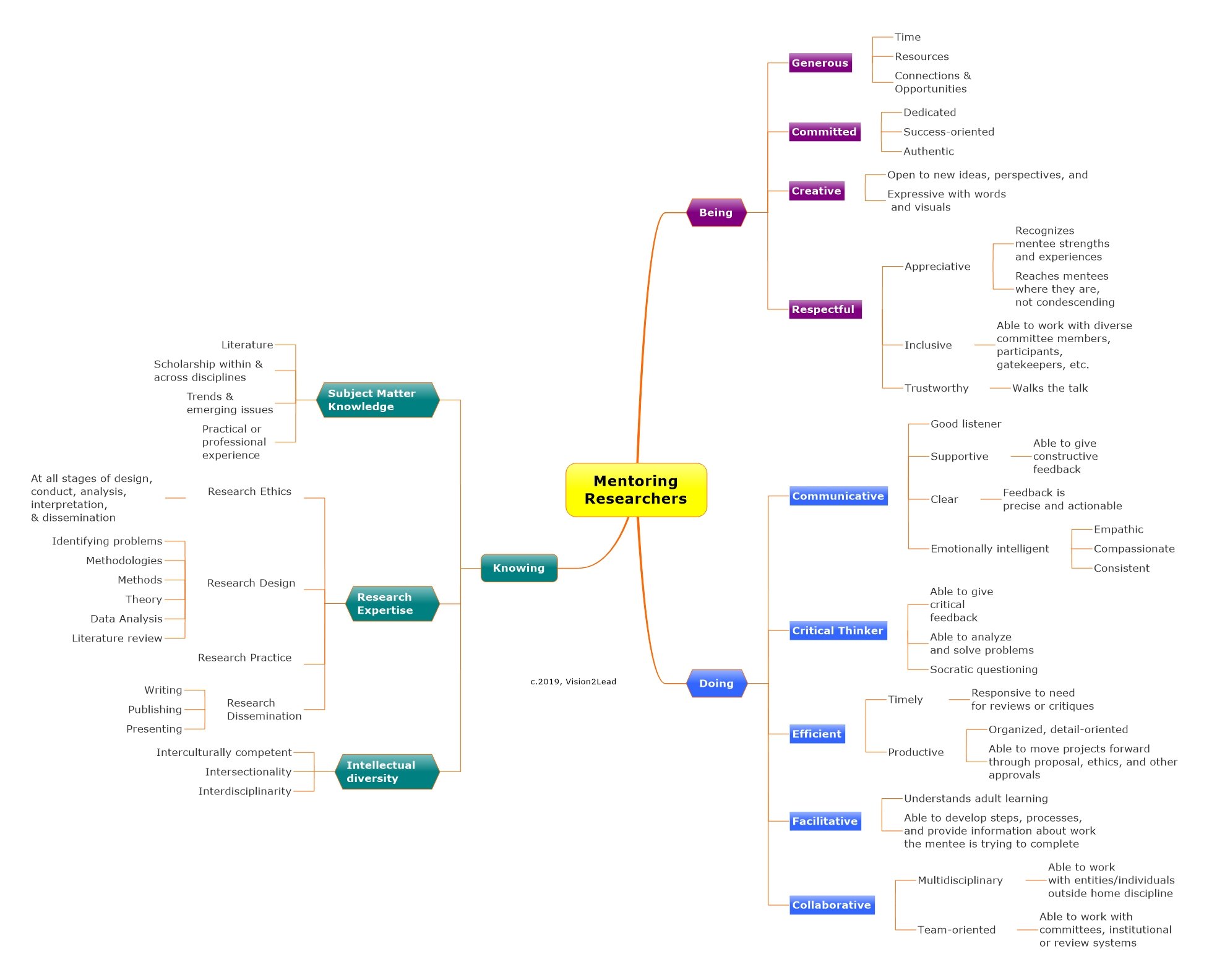What makes a good mentor?
by Janet Salmons, PhD Manager for the Sage Research Methods Community
What is a mentor?
The Oxford English Dictionary offers a succinct definition for the term mentor:
An experienced and trusted adviser.
(Soanes & Stevenson, 2004, p. 893 )
Two inter-related components of this definition are experience, and trust. What do these concepts mean in the context of a mentoring relationship in a research context? In some doctoral programs, the term mentor is given to faculty who are dissertation supervisors. In some professional settings a mentor is assigned as part of on-boarding someone new or preparing someone for a new role. For others, the term refers to someone who takes you under their proverbial wing.
We’ll describe the first as institutional mentoring, that is, a relationship where the contours are set by the institution or program that sets out roles, boundaries, goals, expectations, time commitment and completion. We’ll describe the second term as informal mentoring, a voluntary relationship where the contours are set by the individuals
Learning from experience
Thinking about mentorship, I can't help but reflect on my experiences as both a mentor and a mentee. Oddly, the best descriptor is the title of an old movie: three weddings and a funeral. With three mentors I had transformational learning experiences. One was a mentor for the thesis stage of my Masters program, one mentor was an expert in a field I was studying, and the third was associated with a professional leadership development program. The first was institutional, the second two were informal mentoring arrangements.
Thanks to each of them, I learned as much about myself as I did about the topics I was studying. All three, in their own unique ways, offered me insights into the work at hand, affirmed my strengths, and pointed out ways to improve. At times when I was forming a concept of what I wanted to achieve, they helped me think through life and career goals and aim in new directions. They each helped me spiral upward!
In contrast, the fourth (institutional mentor) got mad at the academic institution where I was completing my Ph.d., the institution where he was being paid. I, however, paid the price, even though the issues were unrelated to me. He stopped communicating or moving the dissertation completion process forward, and left me in a precarious situation. It was a kind of funeral, because all hope for a meaningful learning experience died. I was compelled to appeal to the dean who ultimately had to step in and oversee the final stage of the doctoral program completion. It took a long time to put this terrible situation into a larger context, and take constructive lessons from it.
These four experiences shaped my sense of what makes a good mentor. When it was my turn to take the role of mentor, the term used for the dissertation supervisor at the institution where I served on the faculty, I aspired to be like the ones who influenced me in positive ways (and avoid any funerals.)
What makes a good research mentor?
What are the characteristics of mentors who successfully motivate and guide student or novice researchers? I often brainstorm with mind maps, so that is where I began. I wanted to differentiate between having relevant knowledge, what I thought of as a cognitive side, and the affective and "people skills" side. Going back to the definition above, knowledge based in research experience and people skills that engender trust are essential. To gain more insight on the elements to include, I consulted colleagues whose mentoring abilities I've seen in action, and my former mentees, now professionals and academics. The following two maps took shape.
Mapping core characteristics
At the most fundamental level, it is not enough to have adequate knowledge, unless we have the attitudes and actions that allow us to relate to mentees and their journeys. This map illustrates this point with three core characteristics for good mentors: knowing, being, and doing.
I suggest that we need to know the subject matter being studied and research methodologies and methods appropriate for the mentee's inquiry. We also need awareness of how our work fits within a larger intellectual context. We need the characteristics associated with doing, which are practical and skills-oriented. Without being able to do the work of mentoring, our knowledge is not helpful to anyone else. The dimension of being describes the personal, human qualities that allow us to connect with mentees in ways that have the potential to make a real difference.
Mapping the big picture
I've fleshed out the map, with the help of those who gave feedback. Details will undoubtedly vary depending on circumstances of the mentoring relationship, and the needs and preferences of mentor and mentee. Those serving in a formal institutions role in an academic program, such as dissertation or thesis supervisors, might focus more on the doing side because their mentees need to meet program requirements. Mentors in a more informal setting might focus more on being present and encouraging to their mentees. But I would argue that in most situations where the mentoring involves research, the three dimensions of knowing, doing, and being, are inter-related. If one is missing, the mentee is not fully served and the potential for the relationship is not met.














Discover a new open-access hub for instructional materials you can adapt for your (quantitative) research methods courses.